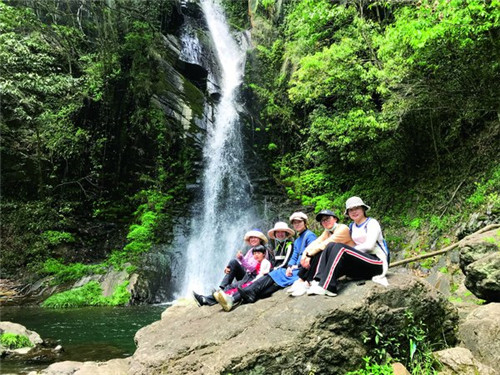
Women who dedicate themselves to the protection of Qiandao Lake’s water source pose for a group photo.
Located in Chun’an, a county in Hangzhou, in east China’s Zhejiang province, Qiandao Lake boasts the picturesque view and first-grade water quality. Five women, from various regions of China, during the past few years have strived to strengthen the protection of the lake’s water source, while at the same time they have helped farmers attain wealth by planting rice in clear water. Through their efforts, the women have proven that lucid waters and lush mountains are as valuable as “mountains of gold and silver.” The idea, advanced in 2005 by Chinese President Xi Jinping, then-Secretary of Zhejiang Provincial Party (Communist Party of China) Committee, stresses the importance of environmental protection and green development.
Water in the gurgling stream flows past Xiaqiwu (a village in Anyang, a township in Chun’an). Mu Quan, who has been working in the village for the past four years, is delighted to watch that water flow. In 2015, Mu received her Ph.D. from the College of Environmental Sciences and Engineering, under Peking University. She is a senior project officer with the Nature Conservancy (TNC). Despite her fine, delicate features, she is an independent, courageous woman.
At the invitation of a team of experts, from the World Bank, Mu and other TNC members, during the summer of 2016, inspected Qiandao Lake. “For the first time in my life, I saw such a beautiful lake, surrounded by green mountains. At that moment, I made up my mind to do something to protect the clear, sweet water,” recalls Mu.
During the past few years, Mu has visited farmers and cadres in all of the towns and townships in Chun’an, to explore ways to strengthen the protection of the lake’s water source, while at the same time to help farmers attain wealth.
To protect the lake’s source of quality water, Alibaba (China’s e-commerce giant) Foundation, Minsheng Tonghui Public Welfare Foundation and Wanxiang Trust in 2018 established the Qiandao Lake Water Fund. The fund is the largest of its kind in the country. Mu put a lot of effort into promoting establishment of the fund.
With the help of Anyang’s government, Mu in the same year set up an ecological rice field and an ecological tea park. Although she was several months pregnant at the time, she led farmers (in Anyang) in using scientific and technological knowledge in production. Mu and the farmers have since seen substantial increases in the output of the rice and tea, and they have noticed marked improvements in the quality of the harvests. Mu has also helped the farmers sell their products, and she has explored ways to improve the added value of the products.
In 2019, four young women — Guo Feifei, Wang Xiaomeng, Zeng Xinran and Yin Huiqing — joined the fund. Mu and the four women became a team determined to protect the lake’s precious water source.
Guo, employed as the fund’s project manager, claims she never screams when she sees a worm. “I enjoy the free, serene life in the village, which is vastly different from the bustling downtown life,” says Guo in Hangzhou China. “The beautiful view and fresh air (in the village) are precious intangible wealth … I hope more people will understand why we put so much effort into protecting the lake’s water source.”
Before she became the fund’s brand director, Wang was the host of a travel program, broadcast by Shijiazhuang (a city in North China’s Hebei Province) Radio and Television Station. “I hope, through our efforts, more people will understand the importance of protecting the lake’s water source. I also hope more environmental enthusiasts will join us in creating an ‘ecological paradise’ in Anyang,” says Wang.
Zeng and Yin’s major responsibility is to conduct various promotional activities, to help people improve their awareness of the importance of environmental protection. “We’ll try our best to help visitors understand the lake’s unique beauty, and its rich natural resources,” says Zeng. “More importantly, I hope, through our efforts, more people will realize (people) should try their best to preserve natural beauty, so they can live in harmony with nature.”
Despite the changes in her status — from an overseas returnee to an employee with a privately run company, and from a cadre with an institution to a volunteer environmental-protection advocate — Yin during the past decade has stuck to her dream of helping people raise their awareness about the importance of preserving nature. “I hope more people will join us in protecting the lake’s water source and ecological environment, so the natural resource will achieve more social and economic benefits,” says Yin.
The women during the past few years have organized various parent-child activities, during which parents have grown rice in water and/or sought “treasures” (including loaches, snails and earthworms) in mud with their kids. Many residents have said the activities have helped them both educate their children and improve their relations (with their kids). The residents have also said participating in such activities has been a good way to spend time with their children.
As the story about the five women has been spread far and wide, more than 5,000 volunteers, from various regions of the country, have joined the women in protecting the lake’s water source and ecological environment.
Photos supplied by Qiandao Lake Water Fund
(Women of China English Monthly November 2020 issue)
Media Contact
Company Name: The Information Office of Hangzhou Municipal Government
Contact Person: Cai Jingwen
Email: Send Email
Phone: 0510-68559077
Country: China
Website: http://www.ehangzhou.gov.cn/
